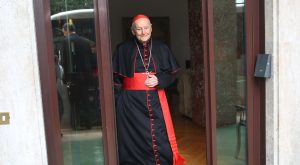Distinguished faculty, professors, along with Georgetown undergraduate and graduate students gathered to award an honorary degree to Georgetown’s newest alumna, Leymah Gbowee in Gaston Hall on Feb. 13.
Gbowee spearheaded the Women of Liberia Mass Action for Peace, in 2003, bringing together Christian and Muslim women to orchestrate a nonviolent peace movement in the Second Liberian Civil War. She is a Nobel Peace Prize Laureate, women’s rights advocate, peace activist, and trained social worker, as well as the founding leader of global peace initiatives, including the Gbowee Peace Foundation Africa and Liberia Reconciliation Initiative.
Among Gbowee’s many social initiatives, the Gbowee Peace Foundation Africa shines as it focuses on providing women and youth in West Africa with access to education to ensure future generations have the tools for sustainable peace. The Liberia Reconciliation Initiative builds upon her work for peace and concentrates on securing and promoting peace and post-conflict reconciliation following the Liberian Civil Wars.
In honor of Gbowee’s leadership efforts in the Liberian peace process and her ongoing advocacy for women’s rights and facilitation of peace, the university conferred upon her the degree of Doctor of Humane Letters.
Following a reading of the University Charter and Degree Citation, President John DeGioia conferred the degree upon Gbowee and gave his opening remarks to her Oliver Tambo Lecture titled “Peace is…”
The Oliver Tambo Lecture commemorates anti-apartheid activist Oliver Tambo’s 1987 speech at Georgetown and offers a platform for global speakers to explore challenges faced in Africa at the university. In April 1986, following Georgetown’s Student Coalition against Apartheid and Racism effective sit-in protest, the University voted to divest about $9 million of its holdings in companies that had financial interests there.
In her lecture, Gbowee shared firsthand experiences from her career and experience growing up in the First and Second Liberian Civil War. She explained what she had learned about peace and provided critical insight into the concept of peace itself.
Gbowee voiced concern about the contemporary understanding of peace, stating, “Peace has become a mist. With all of our intellectualism, we seem to have also distorted and lost the definition of peace.” She brought attention to prevailing challenges of peace, including the “Us vs. Them” mentality caused by charged by political rhetoric.
According to Gbowee, this mentality deters needed dialogue in times of conflict because it alienates the Other in the conflict, making reconciliation and by extension peace slips through our grasp. Gbowee also highlighted the reduction of casualties in conflicts to statistics as a threat to the concept of peace, and called on the audience to recognize victims of conflict by name during peace-building processes. Gwobee emphasized that these numbers were dead children and mothers in pain, and they deserved the dignity to be remembered. “Name people. Do not substitute them for stats and numbers,” Gwobee urged.
Continuing her definitions of peace, Gbowee highlighted that “Peace is not jumping on a train. Peace is not hashtag. Peace is being prepared to journey even if you are the last man or woman standing.” She emphasized the sacrifices necessary for genuine peace, stressing that mere participation in popular social media trends and performative activism falls short of what’s needed to achieve lasting peace.
Universal access to education, Gwobee argued, was another key tenet of peace. Gwobee’s Peace Foundation includes a chapter, the African Youth Education Initiative, specifically dedicated to empowering women through access to education and equipping them with the tools to survive.
As Gwobee concluded her speech, she encouraged the audience to engage in dialogue and have compassion for our perceived enemies – those dubbed as the “Other.” Ending with a final definition of peace, Gwobee stated: “Peace, distinguished ladies and gentlemen, is recognizing and honoring our collective humanity.”
In a reception following the event, Georgetown students expressed a profound inspiration drawn from Gbowee’s impactful words.
“Her words are so encouraging, especially for someone in the SFS, who may work in sustainable development,” Zifei Zhao (SFS ’27) said.
Gwobee’s resilience, which started as a young child, and her subsequent advocacy for peace and security in Liberia inspired Maya Smith (SFS ’25). Smith’s key takeaway from the event and Gwobee’s journey is that “anything is possible.”
In addition, Edidiong Obot (MPP ’24) expressed how impactful it was to see a fellow African woman be honored at Georgetown for her work. “People like Gbowee pave the way for us, so we’re able to stand on their shoulders and walk in their footsteps, as well as create our own pathway,” said Obot.






